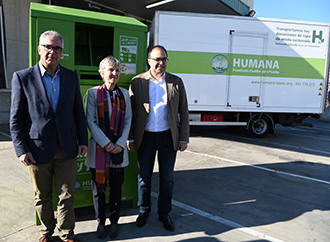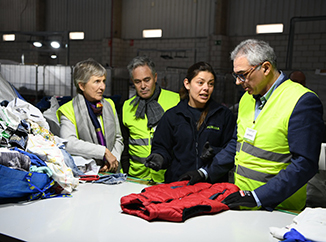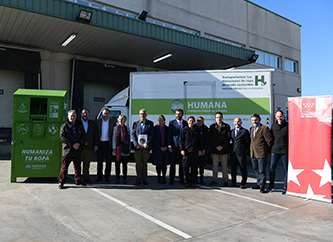consent_cookie
Duración: 1 year
Stores the user's cookie consent state
08-02-2019
Carlos Izquierdo, Regional Minister for the Environment and Territorial Planning of the Community of Madrid, visited the Humana Resources Textile Preparation Plant in Leganés today.
The objective of the visit to these facilities has been to raise awareness of the importance of textile waste according to the Strategy for Sustainable Management of Waste 2017-2024 in the Community of Madrid.
As pointed out by the Ministry itself, thanks to the preparation for reuse and the promotion of recycling, it prevents tons of textiles from reaching the landfill each year and having a second life, as well as contributing to social projects that have numerous benefits in our environment.
Sustainable waste management and sustainability
Waste management is one of the key pieces of sustainable development. And within it, the textile, considered the fifth fraction in importance, requires new solutions and processes capable of responding to the challenges it poses: every year the Spanish discard 1 million tons of used clothing and footwear. However, only 10% of that amount is recovered by authorized managers, according to data from the Waste Agency of Catalonia and the Ministry of Environment and Ecological Transition.
The Strategy for Sustainable Management of Waste of the Community of Madrid 2017-2024 itself establishes the composition of household and commercial waste generated per person, which indicates that the average per capita gross is 30.65 kgs in the case of textile. This figure represents 7.82% of the domestic and commercial waste generated in the region. 25.48 kg are collected in the rest bag.
Discarded textile products have a market value that makes their reintroduction into the market economically viable, either through their reuse or recycling.
The European Union has decisively marked the agenda in terms of textile management: on the one hand, by placing in general terms at 55% the percentage of waste that must be recycled before 2025. In addition, as of that date The selective collection of this material will be mandatory in all European municipalities.
In order to promote the preparation for the reuse and recycling of textile waste, the Community of Madrid has established the following measures:
THE PREPARATION PLANT FOR THE REUSE OF LEGANÉS
In this context, in order to continue advancing and responding to the challenges posed by an efficient management of textiles in the XXI century, Humana Pueblo Foundation for People launched in early 2018 the second phase of its Preparation Plant for Reuse of Leganés.
These facilities, added to those of the operational Humana plant since 2010, make it the largest center in Spain dedicated to the management of used textiles:


